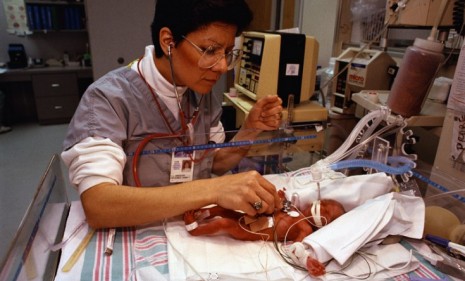The new crack babies: Blame prescription drugs?
Legal prescription drugs have become a troubling addiction for pregnant women — and their children are paying the price

A free daily email with the biggest news stories of the day – and the best features from TheWeek.com
You are now subscribed
Your newsletter sign-up was successful
Babies born addicted to crack cocaine were a scourge of cities in the 1980s, but today, in hospitals across America, doctors are delivering a new kind of crack baby: Newborns addicted to the prescription drugs that their mothers abuse. While doctors and nurses struggle to find safe, effective treatments for "newborn withdrawal syndrome," the number of drug-addicted babies continues to increase. Here's what you should know:
Why the sudden rise in drug-addicted babies?
It's largely due to "Pharmageddon," the alarming rise in prescription drug addiction, which has reached epidemic proportions nationwide. Deaths caused by prescription drug overdoses are now greater than those caused by heroin and cocaine combined. Some of the drugs most frequently abused by pregnant women are the anti-anxiety drug Xanax and the painkillers OxyContin and Vicodin.
The Week
Escape your echo chamber. Get the facts behind the news, plus analysis from multiple perspectives.

Sign up for The Week's Free Newsletters
From our morning news briefing to a weekly Good News Newsletter, get the best of The Week delivered directly to your inbox.
From our morning news briefing to a weekly Good News Newsletter, get the best of The Week delivered directly to your inbox.
How severe is this problem?
It's bad, and getting worse. In some hospitals, 15 to 20 percent of newborns need treatment for withdrawal. Florida, which has emerged as the epicenter of the problem, witnessed some 1,300 babies treated for withdrawal in 2010, a 30 percent increase from the previous year. Across the country, almost 12,000 babies are born each year with newborn withdrawal syndrome, a rate that more than doubled from 2003 to 2008.
Don't pregnant women know these drugs are bad for their babies?
Some don't. Because these are legal prescription drugs, many people assume they're perfectly safe for any use, even by pregnant women. Alternatively, because many of the mothers are young, inexperienced women in their teens and early twenties, they may be reluctant to seek treatment for addiction out of fear the authorities will take their babies away.
A free daily email with the biggest news stories of the day – and the best features from TheWeek.com
How are these babies being treated?
Unfortunately, many hospitals have found they are ill-equipped to deal with the rapid rise in drug-addicted newborns. Some doctors "ran to the books and said, 'OK, what's the best treatment for that?'" says Dr. Terri Ashmeade, as quoted by NPR. Most hospitals are finding that methadone, often used to treat heroin addiction, is the preferred treatment for newborns and pregnant women. Methadone gradually reduces the craving for drugs like OxyContin. Quitting cold turkey isn't usually an option, since the baby could have seizures and die.
What's the outlook for these babies?
Cautiously optimistic. They often must spend the first few weeks of their lives in neonatal intensive care units, where they are weaned off drugs. Treatment for withdrawal can be a very painful process lasting up to 30 days; it often includes vomiting, diarrhea, feeding problems, tremors, and muscle stiffness. "They go through withdrawal symptoms," says neonatal nurse Mary Osuch, as quoted by CNN. "They're crampy, miserable. They sweat. They can have rapid breathing. Sometimes, they can even have seizures."
Sources: CNN, Huff. Post, NPR, St. Petersburg Times
-
 The Week Unwrapped: Do the Freemasons have too much sway in the police force?
The Week Unwrapped: Do the Freemasons have too much sway in the police force?Podcast Plus, what does the growing popularity of prediction markets mean for the future? And why are UK film and TV workers struggling?
-
 Properties of the week: pretty thatched cottages
Properties of the week: pretty thatched cottagesThe Week Recommends Featuring homes in West Sussex, Dorset and Suffolk
-
 The week’s best photos
The week’s best photosIn Pictures An explosive meal, a carnival of joy, and more